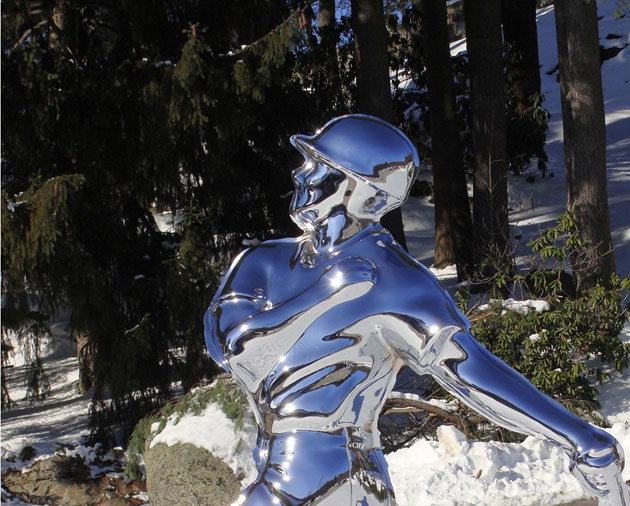
The joke:
“I’ve loved baseball ever since Arnold Rothstein fixed the World Series in 1919.” —Hyman Roth, The Godfather: Part II
Movies love to trot out an elderly character remembering an old ballgame. For some reason, those interminable anecdotes that contribute so mightily to elder neglect become fascinating to us on screen. The oldster gazes through the years at that crisp fall day when McGee leapt six feet to make that spectacular buzzer-beating dunk, or when McGraw swatted one so hard that the bat exploded in fairy dust and the ball landed in a whole other sports cliché.
In Hearts in Atlantis, Anthony Hopkins delivers a textbook rhapsody about Bronko Nagurski driving for a touchdown. (The cheers are still echoing in his brain!)
But what if Hopkins waxed poetic about the day he saw Nagurski poke a defender in the eye while the ref’s back was turned? What kind of a person would he be if that were his touchstone?
He’d be a lot like Hyman Roth.
There have been many attempts to do for Jewish gangsters what The Godfather did for the Mafia. Turns out the one that got it right was, well, The Godfather: Part II. In the film, Lee Strasberg plays Roth, the Corleone family’s aging Miami business partner and an analogue for Meyer Lansky. Lending the role a shifty pragmatism, Strasberg somehow trumps all comers who have actually played Lansky. (Granted, one of them was a pre-handsome Patrick Dempsey.)
Like Lansky, Roth would have been beginning his career in Arnold Rothstein’s heyday. It wouldn’t be unusual for a kid getting his feet wet in organized crime to be impressed and influenced by Rothstein’s most lasting monument—the Black Sox scandal. But his admiration is for more than just a scam.
He realized the American pastime was just another thing to be seized along with the rest of America. It horrified most, drained some, but inspired Hyman Roth.
Roth’s sentiment comes off as a quip, but what an unforgettable establishment of character, as concise and as pregnant as any line of Hemingway’s. “I’ve loved baseball,” he says, not “I’ve loved crime.” He loves the game because it can be commodified, twisted. We know instantly that we’re dealing with a man who has fed off of American decay. These words resonate perfectly in a film about the tarnished American dream—whether it ever existed, whether it’s lost forever, who destroyed it. Michael Corleone is being tormented by that question. Roth sure as hell isn’t. Actually, “fed off” is the wrong phrase: Roth has savored decay.
The 1919 World Series was not the first black mark on professional sports, but it was one that marred the national consciousness. The Chicago White Sox players who conspired to throw a series in which they were the favorites delivered a small but resounding blow to American innocence, one of a relentless tide of letdowns to come in the 20th century. Yet this is the very moment when Roth started loving baseball. It was when he realized that the American pastime, this symbol of so many American values, was just another thing to be seized along with the rest of America. It horrified most, drained some, but inspired Hyman Roth.
Many Jews of his generation found a place in America by building their fortunes and businesses from nothing. Roth was no different. But where the upright sweep such things as baseball scandals under the rug and soldier on, Roth embraced it. It was how he hung his hat in this new country. Where fellow immigrants looked adversity and xenophobia in the face and went where they weren’t wanted, Roth went where no one wanted to be seen.
Could this be Michael’s future? Fondly reminiscing about murder and racketeering, like Grandpa telling Junior how small the schoolhouse used to be? Or is it our future? Aren’t we cheering the young Vito Corleone as he stalks the mob boss Fanucci, high above the parade of pious yokels, taking his first step towards criminal immortality? More to the meta-point, haven’t we mythologized the events of the Godfather movies as a more honorable time in the history of extortion and murder? And Vito hits one out of the park!
I don’t think Francis Ford Coppola or Mario Puzo were quite so far-thinking when they penned this joke, but it’s not too much of a stretch to say that in GFII, they’re having some fun with the fractured nostalgia machine they made in Part I. Consider the choice of Lee Strasberg to play Roth. An immigrant himself, he hardly ever appeared on screen, but his “Method” changed the craft of acting and what North American audiences expected from a character. Like baseball after 1919, entertainment was never the same after the Method, as audiences sampled the headspace of actors like Clift, Dean, Hoffman, Streep, and Don Corleone himself, Marlon Brando. You could still enjoy froth and spectacle, but you had to work harder to forget depth and darkness.
Further, it has been argued that Part II should never have been made—it was a cash-grab, an unwanted coda. Vincent Canby said its biggest attraction was “the insistent manner in which it recalls how much better [the] original film was.” But, with time (and Part III), the film has come to be seen as an artifact of a more honorable age of filmmaking, pre-Jaws and Star Wars. Whatever the film’s merits, claiming Hollywood in 1974 was honorable is like saying the Ty Cobb era of baseball was more progressive. Again, what are we mythologizing?
Old movies, the World Series, your first mob hit. Nostalgia will not be reined in by ethics. Some days will live in infamy, and that’s just how the Hyman Roth in all of us likes it.

